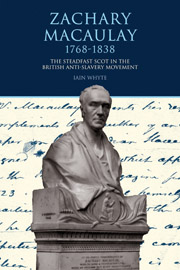Book contents
- Frontmatter
- Contents
- Foreword
- Acknowledgements
- Abbreviations
- List of Illustrations
- Chronology
- Introduction
- 1 From Inverary to the Sierra Leone River
- 2 Slave Traders and French Invaders
- 3 Captive in Love—to Selina Mills
- 4 The Trials of the Governor
- 5 Caught in a Multitude of Tasks
- 6 Clapham, Family and Friends
- 7 Attempting to Win France for Abolition
- 8 ‘Let Us Look it Up in Macaulay’—The Anti-Slavery Arms Manufacturer
- 9 Commerce and Conflict
- 10 Triumph and Tragedy on the Path to Glory
- 11 As Others Saw Him—As We Might Assess Him
- Bibliography
- Index
8 - ‘Let Us Look it Up in Macaulay’—The Anti-Slavery Arms Manufacturer
- Frontmatter
- Contents
- Foreword
- Acknowledgements
- Abbreviations
- List of Illustrations
- Chronology
- Introduction
- 1 From Inverary to the Sierra Leone River
- 2 Slave Traders and French Invaders
- 3 Captive in Love—to Selina Mills
- 4 The Trials of the Governor
- 5 Caught in a Multitude of Tasks
- 6 Clapham, Family and Friends
- 7 Attempting to Win France for Abolition
- 8 ‘Let Us Look it Up in Macaulay’—The Anti-Slavery Arms Manufacturer
- 9 Commerce and Conflict
- 10 Triumph and Tragedy on the Path to Glory
- 11 As Others Saw Him—As We Might Assess Him
- Bibliography
- Index
Summary
The New Campaign
On 18 January 1823 the editor of the Imperial Magazine received a letter which read:
Mr. Macaulay presents his respectful compliments to the author of an excellent paper on West Indian slavery signed ‘Observer.’ He would feel himself particularly indebted to the author if he would afford him an opportunity of personal communication, as the subject is one which deeply interests him.
Zachary Macaulay would have been familiar with the magazine during the time that he was secretary to the Sierra Leone Company and the African Institution. There appears to be nothing unusual in the article, which is a sympathetic eyewitness account of the horrors of West Indian slavery. Yet few such accounts at that time were widely disseminated among the British public. Several months later William Wilberforce wrote enthusiastically to Macaulay, ‘what a good pamphlet that is. Do you know the author? I half suppose that it is yourself in another form, for I know that it cannot be Stephen, and you and he are authors general for our cause’.
The horrors of the slave trade had been well publicised, but now that abolition had been achieved and the abolitionists were focussed on ending the European trade, little attention had been given to those facing a more lingering death on the plantations. James Stephen's attempt to ensure the effectiveness of the embargo and encourage better conditions for slaves by their compulsory registration on estates had been unsuccessful. Zachary Macaulay was to show some foresight in recognising the value of authentic eyewitness accounts in building up public opinion over the much more difficult cause of emancipation.
- Type
- Chapter
- Information
- Zachary Macaulay 1768-1838The Steadfast Scot in the British Anti-Slavery Movement, pp. 169 - 193Publisher: Liverpool University PressPrint publication year: 2011



